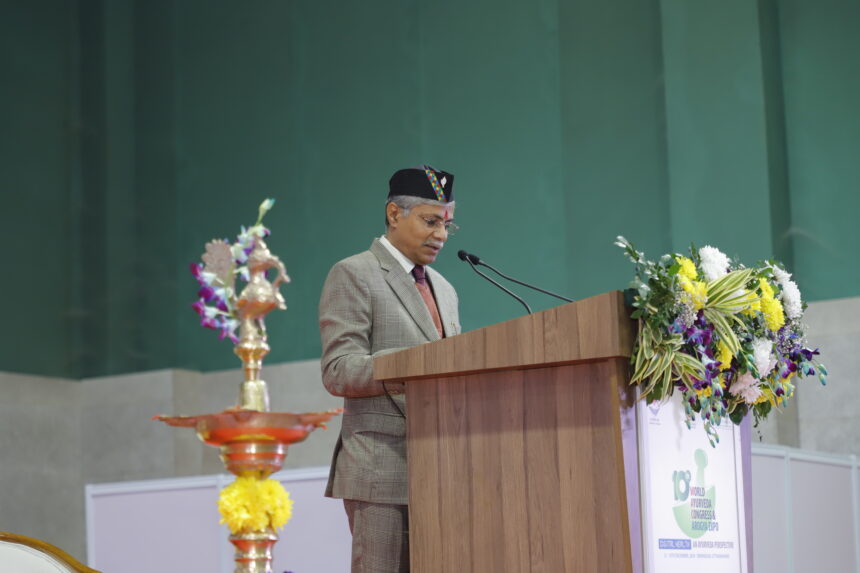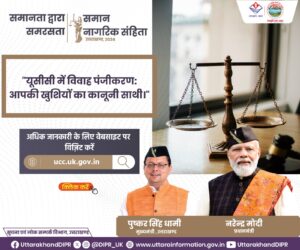Dehradun, Dec 12: Ayush Secretary Vaidya Rajesh Kotecha today said the country is well on its track in the implementation of the 2030 Agenda for the sustainable development of Ayurveda ecosystem based on digital health concepts aimed at achieving the goal of equity in health and wealth with scalability.
Shri Kotecha was chairing the first session of the 10th World Ayurveda Congress, which began here today. The Congress is organised by the World Ayurveda Foundation, an initiative of Vijnana Bharati.
“India has a great digital ecosystem .We have a 2030 agenda for sustainable development. The primary goal for digitalisation in India is equity in health and wealth with scalability,” he said while chairing the session on “Future Ready Ayurveda –Digital Health & Artificial Intelligence.”
“The agenda prioritises ethical, safe and equitable delivery of healthcare solutions, guided by the principles of transparency, accessibility, scalability, inter-operability and privacy,” Shri Kotecha said, setting the context for deliberations at the four-day meet with focal theme : Digital Health – An Ayurveda Perspective .
He outlined the progress on India’s initiatives to accelerate the pace of the ayurvedic renaissance witnessed over the past two decades or so.
Shri Kotecha highlighted the Digital India initiatives, a citizen-centric effort to develop a robust digital infrastructure, covering all ayurveda stakeholders, including practitioners, academicians, public health insurers, medicine manufacturers, non-governmental organisations and regulators.
“The aim is to bring about a digital integrated ecosystem that would support a shift towards a more knowledge-based and precision-based delivery of traditional medical science,” he said.
Shri Kotecha said the NAMASTE (National Ayush Morbidity And Standardised Terminologies Electronic) Portal provides information about standardised terminologies and morbidity codes, aligning Ayush practices with the mainstream healthcare system.
He also touched on the Y-Break initiative, designed to help employees de-stress with a few yoga postures, breathing techniques and meditation during a short break from work. The initiative has already attracted more than one million employees, he said.
The Ayur Research Portal is another initiative that has notched up a high degree of success, he said. With more than 43,000 publications, including in-depth research papers now available, the portal is facilitating drug discovery and delivery of evidence-based medicine as well as aiding R&D efforts in the Ayush sector.
The session also featured Mr Bala Pesala from IIT, Jodhpur, founder and CEO of Ayur.AI, a deep-tech company with the vision of facilitating the practice of evidence-based ayurveda. In his presentation, titled “Ayurveda 3.0: Convergence of Ayurveda, Multi-Omic Markers and Artificial Intelligence for Personalised and Holistic Health”, he said “AI can play a significant role in both diagnosis and interventions,” he said.
“AI can help doctors understand the root causes of diseases and apply the knowledge from machine-learning and deep-learning algorithms in diagnosis and treatment,” he said. That’s a marked improvement from Ayurveda 2.0 of the pre-AI age. He, however, cautioned that AI was not a “replacement for doctors” but rather a tool to “help doctors diagnose and treat ailments better and become better doctors”.
Mr Pesala also gave quick introduction to a couple of innovative apps developed by Ayur.AI. They include AI Well, which uses advanced digital and blood markers, genomics and AI to deliver personalised ayurvedic solutions for wellness and disease management; and AI Kiosk, which enables comprehensive health screening using digital devices within ayurveda parameters.
The session was moderated by Dr Preeti Chhabra, prominent New Delhi-based Ayurvedic consultant.





